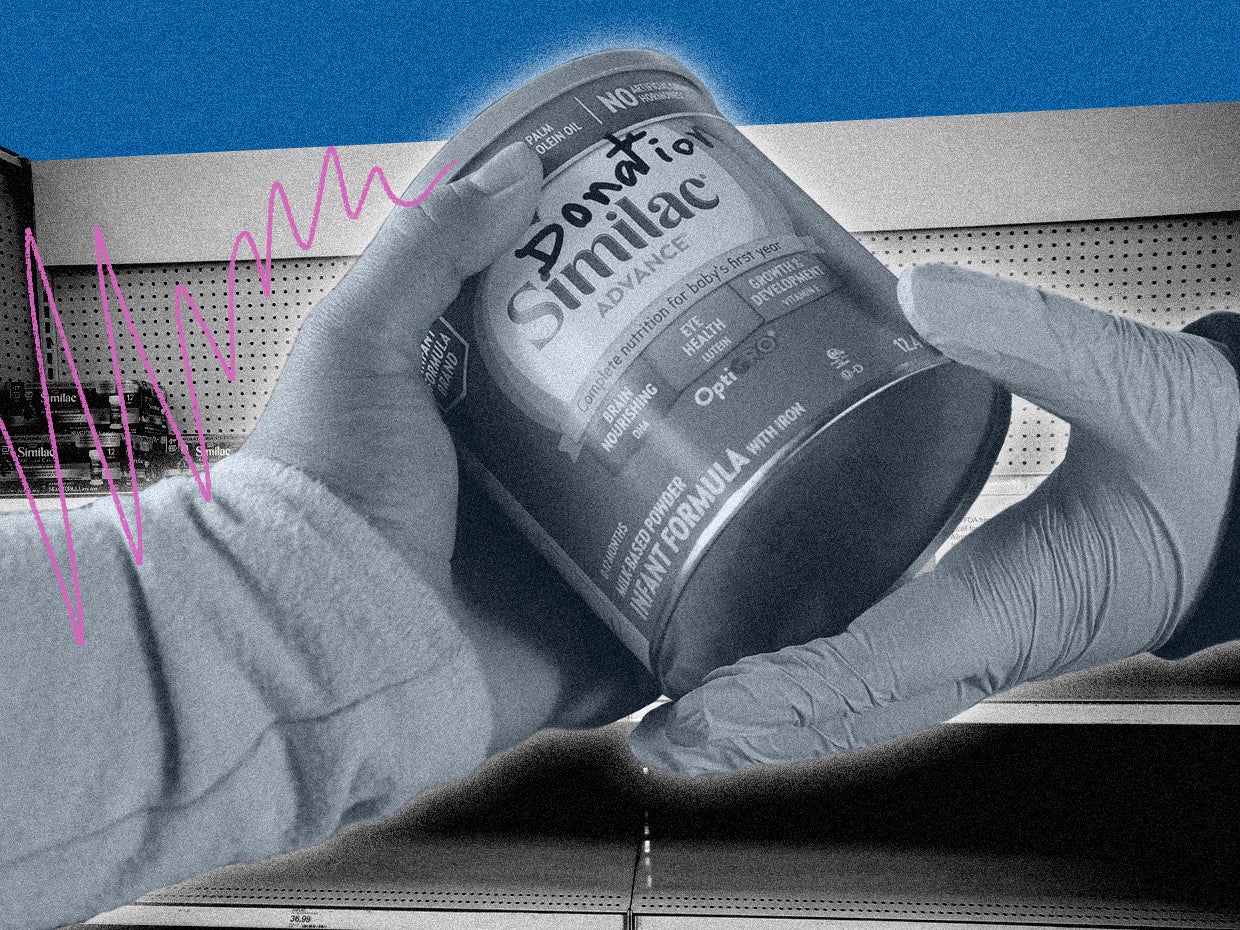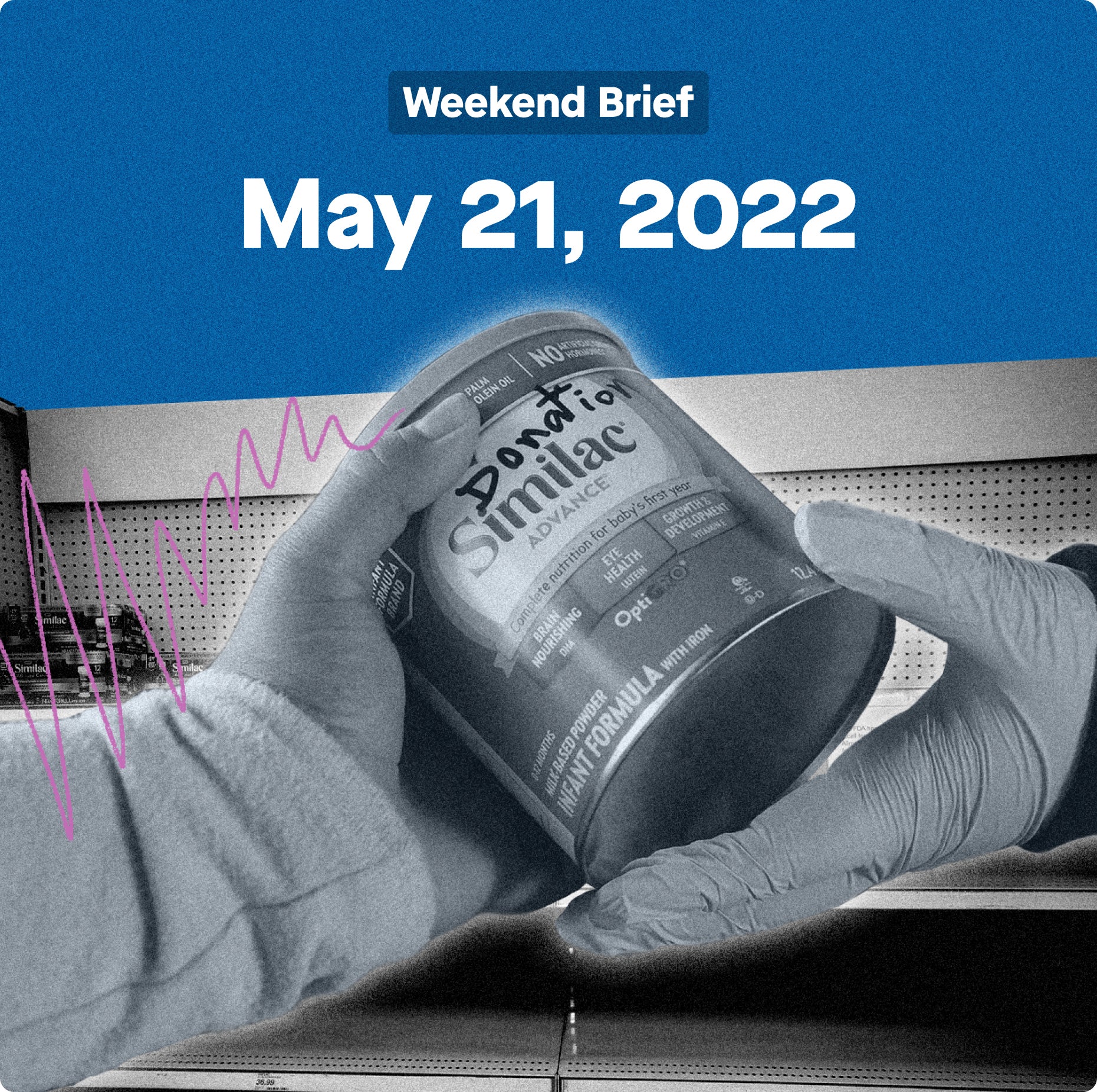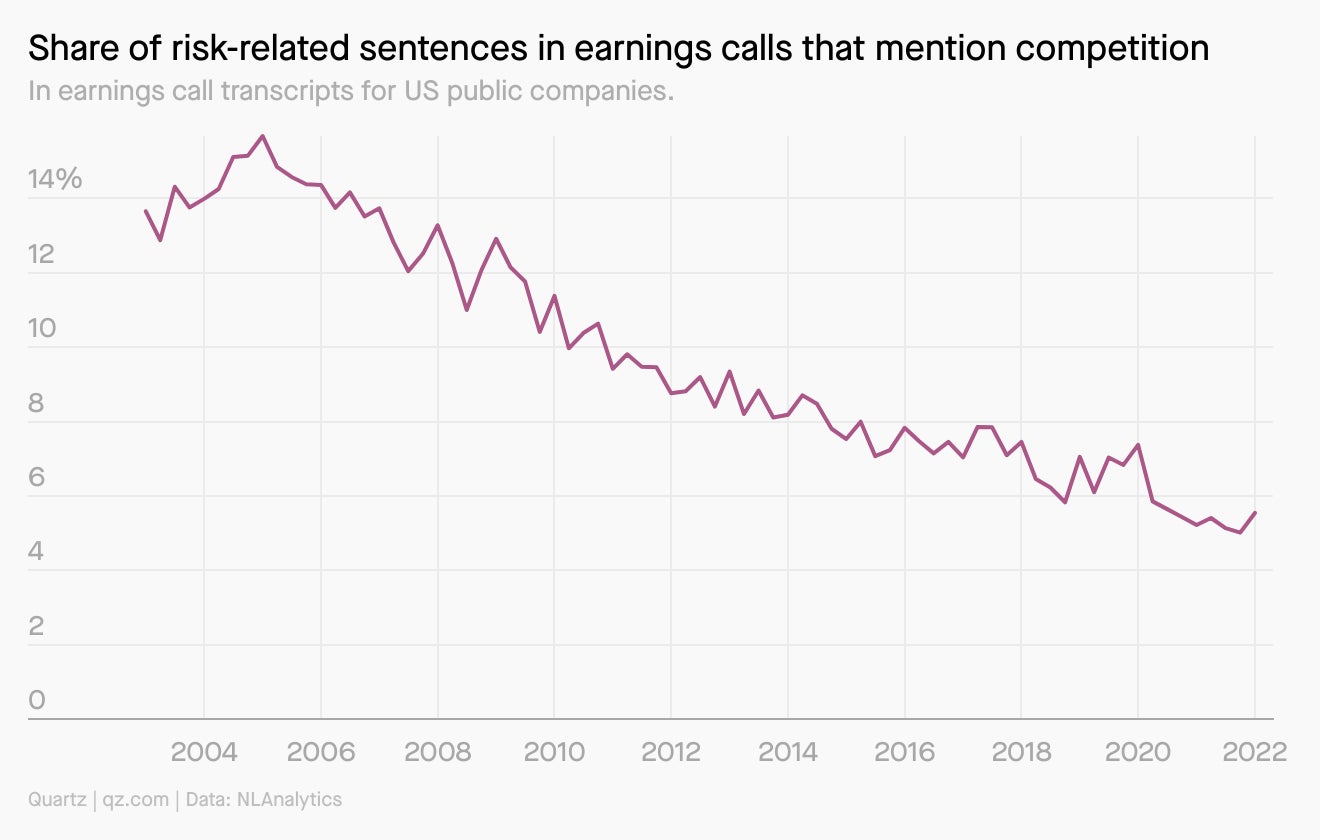✦ America’s monopoly habit
Hi Quartz members,



Hi Quartz members,
The vast shortage of infant formula in the US has one immediate cause: the suspension of operations in an Abbott Laboratories plant in Michigan earlier this year, after samples of a lethal bacteria were found in it. But there’s a bigger structural problem plaguing the American economy: a tendency for many sectors to be controlled by a few companies, or even just one.
The baby food sector, for instance, is an oligopoly, in which two companies—Abbott and Reckitt-owned Mead Johnson—dominate three-quarters of the market by sales. Further, the federal Women, Infants and Children (WIC) program, which offers supplemental nutrition for low-income families, buys and distributes nearly half of all baby formula in the US. The WIC program contracts with a specific company in each state, setting up a de facto monopoly situation. Abbott is WIC’s contracted supplier in 34 states.

In a market of this kind, a sudden disruption can trigger a crisis, and the shuttering of Abbott’s Michigan plant was precisely that kind of disruption. Nor is it the only one in the past few years. Four firms make up three-quarters of the US beef industry, for instance, so when some of their slaughterhouses closed during the pandemic, farmers couldn’t sell their livestock for processing. Bioprocessing supplies are also in the hands of just four companies, leading to crucial bottlenecks in vaccine production. In roughly two-thirds of industries in the US, competition shrank between 1997 and 2016, US census data has revealed. In the words of Sinclair Target, a data scientist at the MIT Media Lab, “The Monopolists Are Winning.”
The backstory
- The US has seen a wave of consolidation. The economy went through a sustained period of deregulation beginning in the 1970s, and a study of 1,345 mergers over 13 years found that multiple sectors consolidated in the wake of it.
- Antitrust rules aren’t keeping up. Regulation has been ineffective at preventing consolidation that hurts consumers, which even the Biden administration acknowledges. “Overly permissive antitrust policy has not only allowed markets to concentrate, increasing the market power of corporations, it has discouraged organic growth through internal expansion and investment in new plant, equipment, and employees,” said Brian Callaci, chief economist at the nonprofit Open Markets Institute (OMI). “Instead, corporations have increasingly turned to buying and selling already-existing assets.”
- Companies have gotten better at working the refs. The explosion of lobbying and political spending in the US in the last 50 years allowed companies new chances to forestall competition by writing the rules to their advantage.
- But a (slow) global reckoning is coming. Competition regulators around the world have launched a bevy of antitrust lawsuits and investigations into corporate concentration, especially in tech. The cases move at a glacial pace, so it can be easy to forget the sheer scale of legal actions slowly working their way through courts and regulatory bodies around the world.
The competition is not fierce
Even CEOs don’t seem as worried about their competitors as they once were. In forthcoming research, Tarek Hassan of Boston University and Ahmed Tahoun of London Business School, co-founders of NL Analytics, look at how often “competition,” “competitors,” and other synonyms are mentioned when US public companies discuss the risks they face in earnings calls. Those words come up about half as often as they did 15 years ago.

It’s possible that the chart reflects some benign change in how executives talk—the method doesn’t capture mentions of competitors’ actual names, for example. Nonetheless, “it is very much in line with many results suggesting a rise in [industry] concentration and an increase in markups,” said Luigi Zingales, an economist at the University of Chicago.
What to watch for next
- Congress tries to break the WIC program’s formula monopolies. The House passed a bill on May 18 that would allow low-income families to choose from a greater number of baby formula brands—but the Senate must approve before it becomes law.
- Military planes will begin airlifting baby formula. Biden invoked the US Defense Production Act this week, allowing him to send military planes to pick up formula from overseas and bring it into the US.
- Has the moment for antitrust legislation passed? A bipartisan group of lawmakers proposed five bills to strengthen US antitrust enforcement last year. Democrats are expected to put them to a vote in June—but as midterm elections approach, the window for bipartisan legislation may be closed.
- The Federal Trade Commission finally has five commissioners. Democrats secured a majority on the premier US antitrust enforcement agency May 11, empowering chair Lina Khan to crusade against corporate concentration.
- Does the public care about monopolies? A wave of popular rage against big tech companies pushed lawmakers to hold hearings and draft bills designed to hold platforms to account, but the formula shortage shows how many monopoly issues exist in less heavily covered industries.
One 🤠 thing
The OMI maintains a list of industries in which companies have consolidated over the years. These range from the trivial to the crucial.
- The cowboy boot business is ruled by four brands that all belong to Berkshire Hathaway.
- Whirlpool bought Maytag in 2006, and by 2018, its washers and dryers constituted up to 58% of their market.
- “At 93 of the 100 largest [airports in the US],” the Institute finds, “one or two airlines control a majority of the market.”
Quartz stories to spark conversation
5 great stories from elsewhere
😬 Jeff Bezos is trying too hard. On Twitter, the land of the droll and the troll, Amazon’s founder fails to earn the title of Poster. A breakdown from The Verge pinpoints why it is that Bezos’s “thinkfluencer” style misses the mark (though not punctuation) when it comes to tweeting.
🤖 A robot wrote this poem. AI has written GPS haikus, rhymed in the style of Samuel Taylor Coleridge, and even published poetry books with cult followings. But as good as bots are at verse, they still can’t achieve “brilliant accuracy,” or so says The Walrus in a rumination on what makes poetry a human act, and whether it could fall to the “ideology of data collection.”
🍑 Butt recovery camp. The Brazilian Butt Lift (“BBL”) industry is booming, and recovery house services have emerged to provide post-operative care. The New York Times profiles women (warning, some photos are graphic) who have convalesced in Miami, and details the unregulated business of care for one of the most dangerous cosmetic surgeries.
🦗 Cricket tartare, anyone? From animal-free meat to locally filtered sewage water, scientists and sci-fi authors alike have some ideas about the future of food. A 100-year exploration from Bon Appetit shows how climate change will shape our meals, and what the next generations might nosh on.
⚱️ The long death of Lehman Brothers. Fourteen years after Lehman’s collapse, Bloomberg depicts a husk of the dead bank, still settling its debts. In its drawn-out denouement, court cases must be resolved and creditors repaid, before the financial titan can finally be laid to rest.
Thanks for reading! And don’t hesitate to reach out with comments, questions, or topics you want to know more about.
Best wishes for a competitive weekend,
—Samanth Subramanian, senior reporter
—Nicolás Rivero, tech reporter
With contributions from Walter Frick and Julia Malleck.